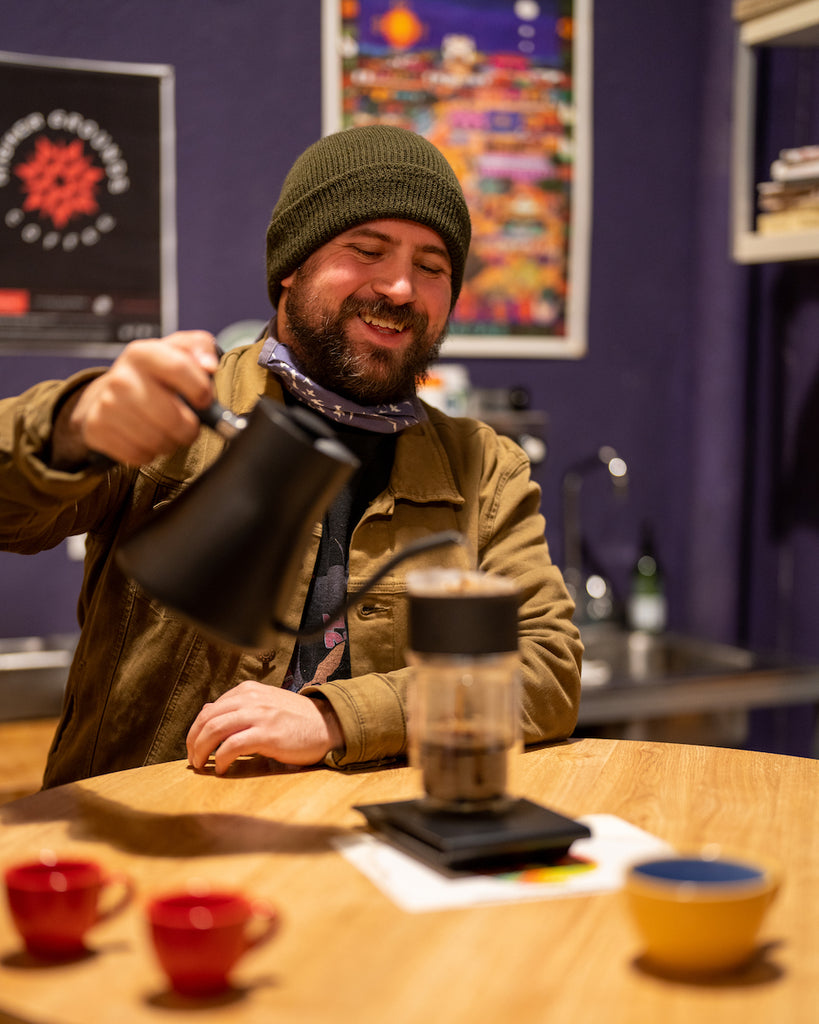
Note: The original version of this article was written by Tasmin Grant and published on Perfect Daily Grind.
For every cup of coffee you brew, roughly 98% is water. But water is rarely just water. Depending on your geographical location, it contains varying levels of a range of minerals and organic compounds.
These minerals and organic compounds – mainly calcium, magnesium, and carbonates – all have different effects on how coffee extracts and what it tastes like. This means that no matter how high-quality your coffee is, your water might be stopping it from reaching its full potential.
To understand more about how water temperature and quality affect coffee, I spoke with Jennifer Yeatts and Maxwell Colonna-Dashwood. Read on to find out what they told me.

Water temperature
Before we get into talking about water quality and mineral content, let’s start by looking at water temperature.
Jennifer Yeatts is the Director of Coffee for Higher Grounds Trading Co., a B-Corp certified roaster in Michigan, US.
“When you’re brewing coffee, you want to keep your water temperature within a range of 90°C and 96°C (195°F to 205°F) to extract the best flavors,” she tells me. “If this temperature range is not maintained, you run the risk of decreasing extraction and losing flavor.”
During the brewing process, Jennifer explains that water extracts a number of volatile flavor and aroma compounds, which contribute to coffee flavour.
If the water temperature is too high, it can become more difficult to control the extraction process. This is because volatile compounds are being released too quickly.
A certain percentage of these compounds are bitter or sour-tasting, which means that when too many of them are extracted overall, the coffee can have a more pronounced bitter or sour taste.
There are also more of these compounds the darker a coffee is roasted. Darker roasts are more soluble than lighter roasts, which means that a lower temperature can help to mitigate the risk of overextraction.
Jennifer notes that this is one of the modules Higher Grounds covers in its barista training course. She also says that using the right equipment (such as temperature-controlled kettles) can help brewers hone in on variables that will improve their coffee's quality.
As well as filtration systems, equipment such as temperature-controlled kettles can maintain stable brewing temperatures. Whether or not they’re temperature controlled, she also recommends gooseneck kettles as they offer more control over the flow rate.
The relationship between water hardness and quality
Maxwell is the co-owner and Managing Director of Colonna Coffee in Bath, UK. He is also the founder of water filtration system Peak Water and the co-author of Water For Coffee.
He explains the difference between water quality and hardness.
“Different regional and global water supplies treat water differently,” he says. “Plenty of municipal treatment systems produce water which is safe to drink, but it may not necessarily be good quality.”
The water used to brew coffee should always be clean, visibly free of contaminants, and odourless, but hardness and quality can vary from region to region.
“High-quality drinking water might not always be the best for making coffee,” Maxwell explains. “Bottled water brands like Evian, for example, are high-quality, but also relatively hard.
“The coffee industry talks a lot about water hardness as it’s a key metric for assessing carbon content and its impact on pipes and machines,” he tells me. “Water hardness, in terms of total dissolved solids (TDS), is a measurement of the minerals and ions in water.”
TDS meters can be used to detect the levels of microscopic minerals and organisms present in water in measurements of parts per million (ppm – a measurement of milligrams per litre).
However, there are two types of hardness. Total hardness is the amount of calcium and magnesium present in water, whereas carbonate hardness is a measurement of the levels of carbonates and bicarbonates.
Maxwell explains why carbonate hardness is often referred to as “temporary hardness”.
“When calcium is present in water, it fuses with carbonates to become calcium bicarbonate. This is deposited as limescale.”
Limescale can be found on the inside of brewing devices and coffee machines (including kettles and espresso machine boilers) as chalky deposits.
“This hardness can cause damage to boilers and machines,” Maxwell says.
For brewing, the SCA recommends using water with a total hardness of 50 to 175ppm and a carbonate hardness between 40 and 75ppm.
“You can also have water which is low in carbon but has a high TDS level, which means it won’t deposit limescale,” he adds.

Carbonates: What role do they play?
During his 2014 World Barista Championship routine, Maxwell emphasized the importance of optimal mineral content for coffee extraction. He brewed three different versions of a washed Ethiopian filter coffee, each containing different levels of magnesium, calcium, and carbonates.
Calcium and magnesium ultimately affect coffee flavor. But the levels of these minerals remain largely unchanged. Carbonates, however, are more easily lost, especially when water is boiled for brewing.
Maxwell tells me more about why it’s important to have carbonates in your water.
“Adding carbon is useful for removing chlorine and other contaminants,” he says. “However, adding carbon will not manipulate the mineral content of the water – including calcium, magnesium, sodium, and potassium levels.”
In his WBC routine, Maxwell highlighted how bicarbonates play a crucial role in developing coffee flavor.
Bicarbonates are first formed when carbon dioxide reacts with water molecules to create carbonic acid. The acids then react with carbonates to form bicarbonates.
“Bicarbonates are sometimes referred to as ‘buffers’,” Maxwell tells me. “The higher the number of bicarbonates, the more the acidity will be buffered or reduced.”
The SCA recommends pH levels between 6 and 8, which are neutral. Higher pH measurements (i.e. more alkaline water) indicate the presence of more bicarbonates in the water. Consequently, the acidity levels of the coffee will be reduced.
Conversely, fewer bicarbonates will reduce the pH level and make the coffee more acidic and sour-tasting. Ultimately, having a balanced amount of bicarbonates in your water is important for extracting high-quality coffee.

Effects on extraction
Magnesium, calcium, and carbonates all contribute to the extraction of flavor in coffee, but in different ways.
Maxwell emphasizes that the volume of carbonates and bicarbonates in water can be the biggest indicator of how flavor might be influenced.
“Once you test the alkalinity of the water, you can better understand how it will affect coffee flavor,” he says.
Using pH testing strips is a good way to understand the exact acidity or alkalinity of your water.
Maxwell adds that hardness levels will also influence the flavors and textures of coffee.
“If the water is soft, then the coffee is going to have a lighter body and be more acidic – potentially to the extent of tasting sour,” he says. “However, if you have hard water, the coffee will have a muddy, thick, and chalky texture and will taste flat.”
Using water quality to guide how you brew coffee can have demonstrable results in terms of final cup quality. A research paper from the Zurich University of Applied Sciences has found that in particular, Brazilian and Colombian coffees scored higher when they were brewed using low to medium water mineral content.

Testing and filtration systems
Understanding water hardness and mineral composition is important, but knowing how to manage and mitigate these factors is essential if you want to brew great-tasting coffee time and time again.
Measuring the pH level and hardness of your brewing water is often the first step in the process.
“The easiest way is using a strip that you would use for an aquarium or pond,” Maxwell says. These kits usually test for pH level, as well as carbonate and total hardness.
Jennifer adds: “TDS meters and refractometers can help you measure your water quality and its impact on your brewed coffee.”
Maxwell says: “If you want to understand everything that is in your water, you need a full lab test. However, local water authorities may publish hardness levels and mineral contents.”
Once you know the hardness of your water, you can then manipulate the mineral contents to the optimal levels.
“If you live in an area with soft water, you can use a carbon stick,” Maxwell suggests.
Active carbon sticks can remove impurities from tap water, helping to some extent. However, they won’t adjust the water’s mineral content.
“If you live in an area with hard water, you might want to use an ion exchange filter,” says Maxwell. “This uses resin-based beads which alter the mineral composition of the water itself.”
As water molecules pass through the resin beads in the filter, minerals are either added or removed – depending on the hardness of the water.
Maxwell adds: “In areas where water hardness reaches over 550 ppm, people should consider reverse osmosis filtration systems, which effectively depressurise water to remove minerals.”
Reverse osmosis filtration uses a semipermeable membrane which allows water to pass through at high pressure. Minerals are removed according to the required hardness levels.
Jennifer highlights some other ways in which you adjust your water’s mineral content.
“There is a huge range of products available on the market,” she says. “These can all help you manage the quality of your water, from full-scale commercial filtration systems to Third Wave Water mineral packets.”

So, how can you improve your brewing water?
Improving the quality of your water can be difficult, but Maxwell emphasizes how understanding more about your local water source is imperative.
“One of the biggest challenges for consumers is that they can only start out with the quality that they already have, so understanding more about the tap water in your area is essential,” he says. “One of the reasons that we created Peak Water was because we noticed that filtration systems in coffee shops were adjustable according to local water quality, which then resulted in the optimal hardness range.
“Peak Water allows home consumers to replicate the water filtration systems in coffee shops.”
For coffee shop owners, Jennifer explains that it’s essential to look at water filtration as a serious option.
“Most commercial coffee equipment warranties come with a requirement to install water filtration,” she says. “If filtration is not used, the warranty could be void.”
It should be noted that optimal hardness varies depending on whether you’re making filter coffee or espresso. For home users, it can be worth adjusting your water’s mineral content according to your specific brewing preferences.
“Coffee has a pH level around 5,” Maxwell says. “If you add a small amount of baking soda to bright and fruity-tasting coffee, you will notice the acidity mellows.”
He adds that softer water works better for filter, while espresso works better with more alkaline water.
“Often with filter coffee, people prefer softer water (around 100 ppm) with alkaline levels between 30 and 80,” he explains. “When making espresso, it can be good to use more alkaline water as it helps to balance the acidity of the more concentrated coffee.
“You should also consider which roast profiles you’re using,” he adds.
Lighter roasts are less soluble than medium or dark roasts, so lower mineral levels will allow more of the flavors to be extracted.

As much as water is a key part of your coffee brewing routine, its importance can often be overlooked.
No matter how delicious your coffee might taste, your water will affect its flavour in one way or another. The best place to start is by ensuring the quality and hardness are appropriate for brewing coffee, and then deciding what to do from there.
“Start by testing alkalinity and then consider your solutions,” Maxwell concludes.
Photo credits: Tyler L., Perfect Daily Grind
Please note: Higher Grounds Trading Co. is a sponsor of Perfect Daily Grind.
